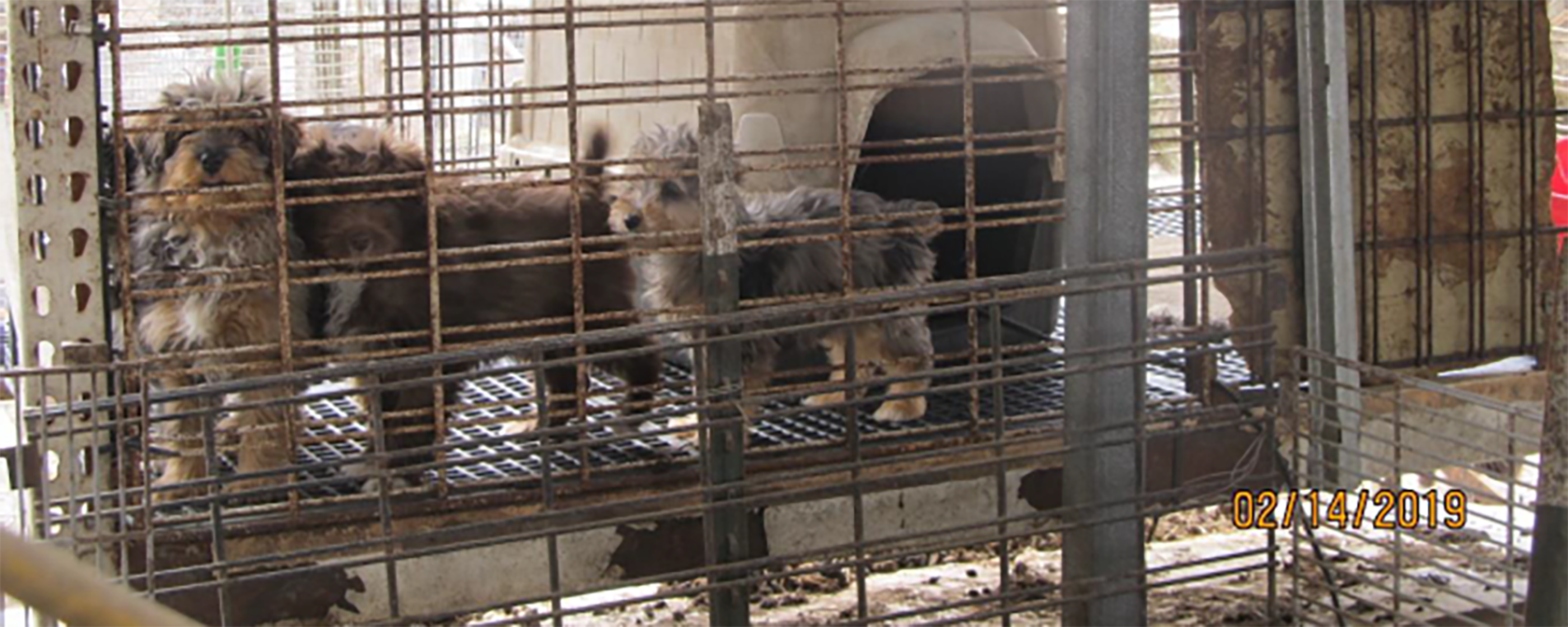By Sara Amundson and Kitty Block
In a photo taken by a state inspector, a dog stands looking away from the camera, her tail pointing down. At first glance, this image may seem like a sweet photo because of the boxer’s soft brown eyes and emotional expression. But farther up in the frame, the dog’s body tells a different story. Her ribs jut out; her hip bones and spinal column are starkly visible. And just beside her emaciated body is a pile of five tiny puppies sleeping next to an empty bowl.
A Missouri Department of Agriculture inspector documented this boxer, whose name is Lindy Lou, at a breeding facility that is still licensed, not only by the state, but by the U.S. Department of Agriculture. The owner, Ellen Roberts (Rocky Top K-9s), is listed in our Horrible Hundred report for the eighth time. Lindy Lou was not confiscated; the inspectors required the owner to have her treated by a veterinarian within two days of the inspection. Despite inspectors finding many ailing dogs in her kennel over the span of a decade, it appears Roberts has faced no serious repercussions, and her “business” is still operating.
Something must be done. Every year in our Horrible Hundred report, we expose 100 problem puppy mills across the U.S. The cruelty is never easy to witness or read about. But sharing the plight of dogs like that mother boxer and her puppies is essential to correcting a broken enforcement system that fails to prevent animal suffering.
Although Roberts’ kennel continues, at least 240 puppy mills that have appeared in prior Horrible Hundred reports have finally closed. We publish the report in the hopes of raising that number every year.
Among other things, the Horrible Hundred report concentrates pressure on government agencies to prioritize the enforcement of humane laws, to confiscate animals who are suffering and, where charges are warranted, to apply strong penalties. The report also serves as a powerful reminder for the public, educating them about common problems at puppy mills and urging people to do their due diligence when searching for a new puppy to bring home. Everyone can take a stand against cruel puppy mills by sharing this information with friends and family members about the shameful industry so often behind cute puppies in pet shop windows or pictured in ads online.
We recently released a 15 year summary of puppy buyer complaints that connects the dots between poor conditions at puppy mills and the industry’s terrible disservice to the public: Thousands of consumers have purchased unhealthy animals, leading to high veterinary expenses and sometimes disability or even death for the puppies involved. We want to raise awareness of these problems and spare families from going through this painful and expensive experience.
Takeaways from the new Horrible Hundred report show systemic problems with mass-scale breeders:
- Many of the puppy mills in this report have been featured in five, six or even eight previous years.
- For the 11th year in a row, Missouri had the most dealers in the report, with 31 dealers on the list, followed by Iowa and Ohio (13 each) Pennsylvania (eight) and Kansas and New York (six each).
- At least 12 of the puppy mills in the report have sold to Petland, the only national chain of puppy-selling pet stores still operating.
Horrible Hundred highlights prove that dogs cannot wait for stricter enforcement:
- At the Rocky Top K-9s property in Missouri, an operation that appears in our report for the eighth time, state inspectors found cockroaches, piles of feces, and many other issues, in addition to the emaciated mother boxer. Yet a USDA inspection in January 2023 did not document any violations.
- Since 2015, at the property of a breeder in Iowa (Steve Kruse/Stonehenge Kennel), USDA inspectors have found more than 125 ailing dogs, including dogs with bleeding wounds, crusty eyes, lameness and hair loss. But the USDA recently relicensed Stonehenge Kennel through 2025.
- At a self-described American Kennel Club breeder in Nebraska (Brenda Carroll/Carroll Sell Farms), inspectors found a bleeding dog and another matted with feces. This adds to the many violations that have been found at the property over the past decade.
- At a facility in Missouri (Mary Smith/Smith’s Kennel) that has sold puppies to Petland stores, inspectors found dead mice and rodent feces. Some dogs didn’t even have drinking water.
- Even though a breeder in Missouri (Sandra Kozlowski/Sho-Me Labradors) surrendered more than 80 dogs to the state a few years ago, she was found keeping dogs in deplorable conditions in 2022 and 2023. Large dogs were confined in tiny airline crates and did not have access to water.
- At a breeding operation in Nebraska (Clem Disterhaupt Jr./Ponca Creek Kennels), inspectors cited more than 100 state violations between 2022 and 2023, calling it “unacceptable,” but our undercover footage from March 2023 shows the kennel remains in operation with many dogs on the property.
To underscore the urgency of helping dogs at these facilities, we are releasing undercover footage of some of the dealers listed in the report.
You can advocate for better treatment of dogs currently languishing in puppy mills by asking your lawmakers to support the Puppy Protection Act of 2023, which would require greater standards of care at commercial dog breeding operations licensed by the USDA.
If you’re thinking of adding a furry family member to your home, please consider adoption first. Animal shelters are full of dogs and cats who would make wonderful companions. And sign this pledge to never buy a puppy from a pet store or online, as you could be supporting puppy mills with your purchase.
Kitty Block is CEO of the Humane Society of the United States.




